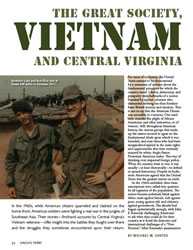The Great Society, Vietnam, and Central Virginia



In the 1960s, while American citizens quarreled and clashed on the home front, American soldiers were fighting a real war in the jungles of Southeast Asia. Their stories—firsthand accounts by Central Virginia’s Vietnam veterans—offer insight into the battles they fought over there and the struggles they sometimes encountered upon their return.
For most of its history, the United States seemed to be characterized by a consensus of opinion about the fundamental principles for which the country stood. Liberty, democracy, and prosperity were hallmarks of a nation founded by upstart colonists who demanded nothing less than freedom from British tyranny and taxation. That is not to say that the American Dream was accessible to everyone. One need only consider the plight of African Americans and other minorities, or of women. Still, throughout American history, the various groups that made up the nation seemed to agree on the fundamental ideals upon which it was founded, and even those who had been marginalized aspired to the same rights and opportunities that were routinely enjoyed by white, Anglo-Saxon Protestant American males. This way of thinking even impacted foreign policy. When the country went to war, it was usually—at least rhetorically—to defend or spread democracy. Despite its faults, most Americans agreed that the United States was the greatest nation on earth.
Entire article available only in printed version. Lynch's Ferry is on sale at the following Lynchburg locations: Bookshop on the Avenue, Givens Books, Lynchburg Visitors Center, Old City Cemetery, Point of Honor, Market at Main, and Lynch's Ferry office at The Design Group, 1318 Church Street, Lynchburg.
Click here for Exclusive Online Content
For most of its history, the United States seemed to be characterized by a consensus of opinion about the fundamental principles for which the country stood. Liberty, democracy, and prosperity were hallmarks of a nation founded by upstart colonists who demanded nothing less than freedom from British tyranny and taxation. That is not to say that the American Dream was accessible to everyone. One need only consider the plight of African Americans and other minorities, or of women. Still, throughout American history, the various groups that made up the nation seemed to agree on the fundamental ideals upon which it was founded, and even those who had been marginalized aspired to the same rights and opportunities that were routinely enjoyed by white, Anglo-Saxon Protestant American males. This way of thinking even impacted foreign policy. When the country went to war, it was usually—at least rhetorically—to defend or spread democracy. Despite its faults, most Americans agreed that the United States was the greatest nation on earth.
Entire article available only in printed version. Lynch's Ferry is on sale at the following Lynchburg locations: Bookshop on the Avenue, Givens Books, Lynchburg Visitors Center, Old City Cemetery, Point of Honor, Market at Main, and Lynch's Ferry office at The Design Group, 1318 Church Street, Lynchburg.
Click here for Exclusive Online Content
^ Top
Previous page: No Matter How Long: The Struggle to Integrate the Public Schools in Lynchburg, 1954–1970
Next page: Exclusive Online Content
Site Map




